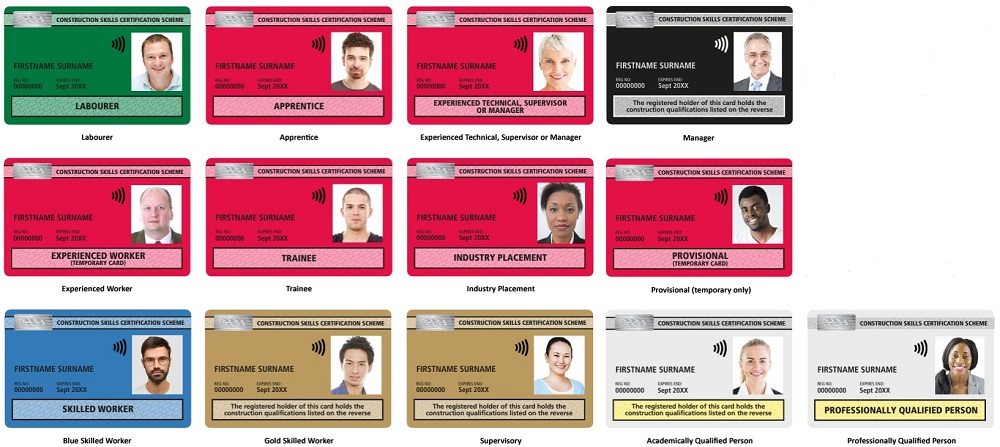What is CSCS in Construction? Key Insights
Reading time: 7 minutes
In order to apply for a CSCS card, individuals must be able to supply copies of their appropriate qualifications, as well as pass a health and safety test. Although not a legal requirement, CSCS cards align with, and support, the UK construction industry’s aim for high standards of safety and competence.
What is CSCS certification?
CSCS (the Construction Skills Certification Scheme) offers an industry-wide recognition of qualifications and training for certain construction roles. To apply for CSCS certification, workers must hold the appropriate qualifications and training for their job, as well as pass a Health, Safety and Environment Awareness test.
A CSCS qualification is usually valid for 5 years, and helps to prove to your employer that you’ve met certain industry standards, and you are competent to do your job safely and correctly. Because of this, many companies will only employ workers who hold CSCS cards. This helps to make sure that only skilled workers are working on projects, after being fully trained in the necessary skills and site safety. Therefore, it is often recommended if you’re serious about progressing your career within construction.
Older CSCS accreditation types, including Industry Accreditation (IA) Cards, are now being phased out. CSCS also differs from the CPCS training programme, which stands for the Construction Plant Competence Scheme. The CPCS course is aimed at plant machine operators, as it includes in-person training and a practical exam at the end.
Nowadays, the CSCS’ CITB Health, Safety and Environment test (known as the HS&E test) can be taken online, rather than within an approved test centre like it used to be, and takes 45 minutes. This is taken in addition to your existing qualifications and training you’ve already received - such as an NVQ - and you’ll need to provide proof of both to apply for a CSCS card.
Is CSCS being phased out?
The Construction Leadership Council (CLC) announced in January 2023 that CSCS IA (Construction Skills Certification Scheme Industry Accreditation cards) are being phased out December 2024. These will be replaced by other forms of accreditation, such as a standard CSCS card and/or the relevant NVQ qualifications for each specialty.
IA cards issued from 1 January 2020 cannot be renewed after 2024. Grandfather Rights CSCS cards will also be scrapped in 2024, in favour of NVQ-based accreditation. IA cards are being phased out as many were traditionally awarded simply from an employer’s recommendation, rather than proven qualifications, skills and training. By updating the guidance, the CLC aims to have a simpler, skills-based accreditation scheme, which gives confidence in a safe and professionally trained workforce.
Modern CSCS cards are still recognised as an important way of proving workers’ key skills and safety training. The standard CSCS cards are currently unaffected by this change. If however you hold a CSCS IA card, you are encouraged to take action before the end of 2024 deadline. There is different guidance for different card types.
Why is CSCS important in construction?
The principles of CSCS is to ensure a safe, skilled and competent workforce within UK construction. The safety of workers and future building users rely upon this, as well as the future of our built environment. CSCS is also part of the government’s Construction 2025 strategy, to improve the productivity, safety and efficiency of the industry, including boosting the numbers of skilled workers.
The aim of having CSCS accredited workers is to reduce accidents on site, promote competence of workers to achieve the best results, and maintain high standards at all times. Promoting personal health and safety, as well as fire safety on site via the CITB test, helps to reduce loss and injury through falls and accidents, as well as help productivity through safe and efficient working practices.
Types of CSCS cards
All CSCS cards require specific qualifications and/or a completed CITB HS&E test, as well as be over 16 years of age and hold the right to work in the UK. There are 12 different types of CSCS card, for different specialties, including:
Labourer: Green Card
The Green CSCS card is aimed at labourers and general site construction workers, and is often considered an ‘entry level’ qualification as no specific NVQ is needed, but you must complete the Health and Safety Awareness Course and pass the CITB Health, Safety and Environment Test (CITB Test).
Trainees & Apprentices: Red Card
If you’re undertaking an apprenticeship or training programme, you can apply for a CSCS Red Card after passing the CITB Test. You’ll also need proof of your current programme enrolment. This is another entry-level option for those who are currently training on the job.
Practical Experience: Experienced Worker Card (Red)
Sometimes known as a Red Experienced Worker Card, this shows that you’ve had significant practical experience on site. You may need to show any relevant qualifications, as well as pass the CITB Test.
Skilled Workers: Blue Card
If you’ve completed an apprenticeship or hold a recognised industry qualification you can apply for a Blue CSCS card, to prove your higher skill or training level. As well as providing proof of your qualification, you must pass the CITB Test.
Managers & Supervisors: Gold Card
A CSCS Gold Card is ideal for professionals within the industry, such as site managers, who have a higher competency level and supervise teams. Relevant qualifications will be needed, such as NVQ Level 3 or SVQ at SCQF level 6, as well as proof of experience and completion of the advanced Construction Industry Training Board (CITB) Managers and Professionals HS&E Test.
Senior Managers: Black Card
The CSCS Black Card is designed for directors and senior management within the industry, and will need appropriate senior qualifications as well as proven managerial experience and passing the Managers and Professionals CITB Test.
Academics: White Card
For construction-related qualifications, such as architecture or engineering, but limited practical experience on site, the CSCS White Card (also known as the AQP CSCS Card) is recommended. Qualifications must be recognised by the AQP card category, and the CITB Test passed.
Older card types, such as the IA cards and Grandfather Rights CSCS cards are being phased out.

How to obtain a CSCS card?
CSCS Cards can be applied for after proven experience, training and health and safety knowledge is provided.
Step 1: Card type
Although CSCS cards are organised into colour categories, different job roles may come under slightly different card types. Find your card category on the CSCS website before you apply.
Step 2: Qualifications proof
You’ll need to scan and upload copies of your relevant qualifications, and/or professional body membership. Different card types may also ask for additional evidence, such as supervision (if relevant).
Step 3: Health & Safety test
All card types require passing the Construction Industry Training Board (CITB Test), within the last two years before applying, which tests your health and safety plus environmental knowledge on construction sites. You’ll need to supply your test ID number (stated on your pass certificate).
Step 4: Apply online and pay the fee
Apply via CSCS online (you’ll need to register if you’ve not applied online before, or sign in) and pay the application fee (currently £36). The CSCS have assistance videos to support your application, if needed.
The card is valid for 5 years unless otherwise stated. You can also renew your card online, as well as search for an existing card holder for verification.
What is CSCS certification: FAQs
What is the CSCS meaning?
CSCS stands for the Construction Skills Certification Scheme, which offers an industry-wide recognition of appropriate qualifications, training, and health and safety awareness (via an online exam) for certain jobs within the construction industry. There are 12 different types of CSCS card available, for different specialist roles.
How long does it take to get a CSCS qualification?
After completing your training and/or qualifications, and passed the 45 minute long CITB HS&E test, you can apply for a CSCS card. Following approval, cards normally arrive within 10 days.
How much is a CSCS card UK?
If you apply via the official CSCS website, cards currently cost £36. Please note though that this does not include fees for any courses required to achieve accreditation - this is purely for your CSCS card which proves your experience and competence.
Is it illegal to work without a CSCS card?
There is currently no legal requirement for construction workers to hold CSCS cards, but it is recommended to help grow your career by proving your skills and experience. Many construction companies make CSCS cards mandatory for employment, as it helps to reduce accidents by having a safe and skilled workforce.
What is the difference between CPCS and CSCS?
CPCS (the Construction Plant Competence Scheme) is a card scheme which demonstrates the skills and competence level of plant operators specifically, whereas CSCS (the Construction Skills Certification Scheme) is aimed at other areas of the construction industry - such as labourers, handymen, skilled construction workers, managers and architects.
Does a handyman need a CSCS card?
Although it’s not illegal in the UK for a handyman not to hold a CSCS card, it’s a way of demonstrating your training and competence. Some construction companies do need a CSCS qualification to allow you to work on site.
It is recommended that a handyman holds a Green CSCS card, Red card or skilled worker (Blue card), depending on their qualifications and specialty.
So, to sum up, CSCS cards are a guaranteed way of proving your skills, ability and health and safety awareness, as well as showcasing any relevant training you have. An employer may need you to show your card before starting work, as it plays an important role in the future of safe, skilled and professional construction in the UK.
Interested in improving health, safety and skills on site? Read more about the current Building Regulations on the Travis Perkins Hub, wish includes the latest excavation safety advice, scaffolding safety legislation and roofing safety rules.
Disclaimer: Information displayed in this article is correct at the time of publication, but note that legislation changes periodically. The information contained on this page is intended as an overall introduction and is not intended as advice from a professional building control officer. Travis Perkins aims to avoid, but accepts no liability, in the case that any information stated is out of date.





